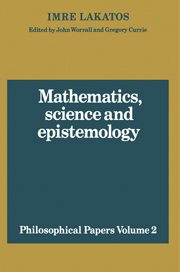Book contents
- Frontmatter
- Contents
- Editors' introduction
- PART 1 PHILOSOPHY OF MATHEMATICS
- 1 Infinite regress and foundations of mathematics
- 2 A renaissance of empiricism in the recent philosophy of mathematics?
- 3 Cauchy and the continuum: the significance of non-standard analysis for the history and philosophy of mathematics (edited by J. P. Cleave)
- 4 What does a mathematical proof prove?
- 5 The method of analysis-synthesis
- PART 2 CRITICAL PAPERS
- PART 3 SCIENCE AND EDUCATION
- References
- Lakatos bibliography
- Indexes
4 - What does a mathematical proof prove?
Published online by Cambridge University Press: 09 January 2010
- Frontmatter
- Contents
- Editors' introduction
- PART 1 PHILOSOPHY OF MATHEMATICS
- 1 Infinite regress and foundations of mathematics
- 2 A renaissance of empiricism in the recent philosophy of mathematics?
- 3 Cauchy and the continuum: the significance of non-standard analysis for the history and philosophy of mathematics (edited by J. P. Cleave)
- 4 What does a mathematical proof prove?
- 5 The method of analysis-synthesis
- PART 2 CRITICAL PAPERS
- PART 3 SCIENCE AND EDUCATION
- References
- Lakatos bibliography
- Indexes
Summary
On the face of it there should be no disagreement about mathematical proof. Everybody looks enviously at the alleged unanimity of mathematicians; but in fact there is a considerable amount of controversy in mathematics. Pure mathematicians disown the proofs of applied mathematicians, while logicians in turn disavow those of pure mathematicians. Logicists disdain the proofs of formalists and some intuitionists dismiss with contempt the proofs of logicists and formalists.
I shall begin with a rough classification of mathematical proofs; I classify all proofs accepted as such by working mathematicians or logicians under three heads:
pre-formal proofs
formal proofs
post-formal proofs.
Of these (1) and (3) are kinds of informal proofs.
I am afraid that some ardent Popperite may already be rejecting all that I am about to say on account of my classification. He will say that these misnomers clearly prove that I really think that mathematics has some necessary, or at least standard, pattern of historical development – pre-formal, formal and post-formal stages, and that I am already showing my hand – that I want to inject a disastrous historicism into sound mathematical philosophy.
It will turn out in the course of my paper that this, in fact, is just what I should like to do; I am quite convinced that even the poverty of historicism is better than the complete absence of it – always providing of course that it is handled with the care necessary in dealing with any explosives.
- Type
- Chapter
- Information
- Mathematics, Science and Epistemology , pp. 61 - 69Publisher: Cambridge University PressPrint publication year: 1978
- 12
- Cited by



